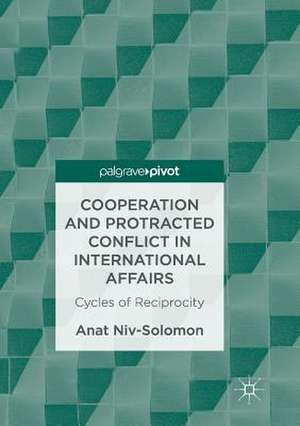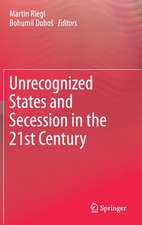Cooperation and Protracted Conflict in International Affairs: Cycles of Reciprocity
Autor Anat Niv-Solomonen Limba Engleză Paperback – 28 iun 2018
| Toate formatele și edițiile | Preț | Express |
|---|---|---|
| Paperback (1) | 410.77 lei 6-8 săpt. | |
| Springer International Publishing – 28 iun 2018 | 410.77 lei 6-8 săpt. | |
| Hardback (1) | 415.95 lei 6-8 săpt. | |
| Springer International Publishing – 10 noi 2016 | 415.95 lei 6-8 săpt. |
Preț: 410.77 lei
Nou
Puncte Express: 616
Preț estimativ în valută:
78.61€ • 81.21$ • 65.42£
78.61€ • 81.21$ • 65.42£
Carte tipărită la comandă
Livrare economică 25 martie-08 aprilie
Preluare comenzi: 021 569.72.76
Specificații
ISBN-13: 9783319833767
ISBN-10: 3319833766
Pagini: 118
Ilustrații: XIII, 118 p. 10 illus.
Dimensiuni: 148 x 210 mm
Greutate: 0.17 kg
Ediția:Softcover reprint of the original 1st ed. 2017
Editura: Springer International Publishing
Colecția Palgrave Macmillan
Locul publicării:Cham, Switzerland
ISBN-10: 3319833766
Pagini: 118
Ilustrații: XIII, 118 p. 10 illus.
Dimensiuni: 148 x 210 mm
Greutate: 0.17 kg
Ediția:Softcover reprint of the original 1st ed. 2017
Editura: Springer International Publishing
Colecția Palgrave Macmillan
Locul publicării:Cham, Switzerland
Cuprins
1. When Reciprocity Sometimes Fail .- 2. Inside the Critical Juncture .- 3. Equal Friends or Equal Enemies: Power Asymmetry and the Impact on Reciprocal Cycles .- 4. The Power of Context: Prospect Theory, Domains of Operation, and Reciprocity .- 5. Reciprocal Cycles in International Politics: Summary and Conclusions.
Notă biografică
Anat Niv-Solomon is Assistant Professor of Political Science and Global Affairs at the College of Staten Island, The City University of New York, USA. Her research focuses on foreign policy decision making for security and human rights, and negotiation and mediation in international conflict resolution.
Textul de pe ultima copertă
This book addresses two main questions: under what conditions does reciprocity fail to produce cooperation?; and when do reciprocal dynamics lead to negative, instead of positive, cycles? Answering these questions is important for both scholars and practitioners of international negotiations and politics. The main argument of this project is that positive tit-for-tat (TFT) and negative reciprocal cycles are two possible outcomes originating from the same basic process of reciprocity. It is important to acknowledge both possibilities and understand when a situation is going to develop into one or the other outcome. The study then calls for a broader discussion of reciprocity in international relations (IR). Specifically, IR should include the negative and more problematic side of reciprocity. To exemplify this, the book provides a detailed analysis of two case studies: border and maritime disputes between China and Vietnam; and Mexico and Guatemala.
Anat Niv-Solomon is Assistant Professor of Political Science and Global Affairs at the College of Staten Island, The City University of New York, USA. Her research focuses on foreign policy decision making for security and human rights, and negotiation and mediation in international conflict resolution.
Caracteristici
Offers an interesting caveat to the theory of reciprocity in International Relations, by focusing on what happens when reciprocity generates negative rather than positive outcomes Provides a detailed analysis of the specific conditions under which reciprocity fails to produce cooperation Utilizes creative systematic qualitative methodologies to analyse two relevant case studies: China and Vietnam, and Mexico and Guatemala

















